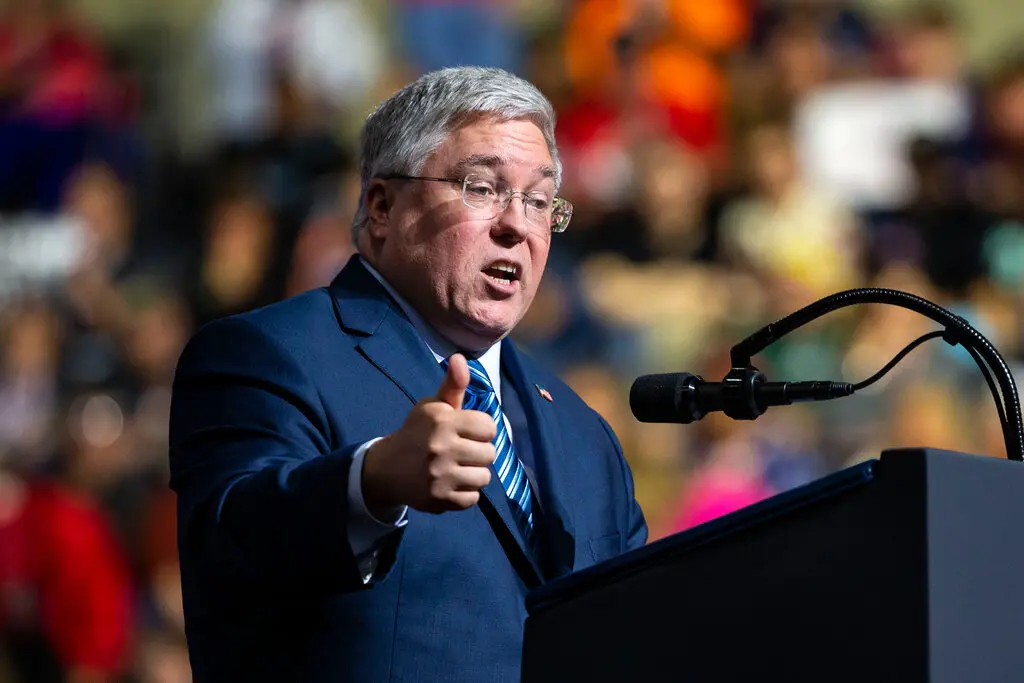Morrisey contextualized the EPA case within a larger bid to use federal agencies to push a climate agenda
After the Supreme Court handed him a win on Thursday limiting the authority of the Environmental Protection Agency, West Virginia Republican Attorney General Patrick Morrisey next takes aim at the Biden administration’s effort to use its powers to regulate capital markets through the Securities and Exchange Commission to push its environmental agenda.
The Supreme Court on Thursday curtailed the EPA’s ability to restrict power plant emissions under the Clean Air Act. Morrisey, who brought the suit on behalf of his coal-dependent state, celebrated the ruling on the John Solomon Reports podcast.
The legal implications of the decision far transcend environmental policy alone, according to the attorney general. “We wanted to say this is really about maintaining the separation of powers, not climate change, because it was about who gets to make the major decisions of the day, not necessarily what those decisions are, but who gets to make it,” said Morrisey.
“And the reason that’s so important, is because when you have something so fundamental, a vast economic and political significance, you want the people’s representatives to make a decision, and to have clear statements, clear lines of delegation to the federal agencies,” he added. “And that did not happen here. That’s why the court said that it was not going to allow the Clean Power Plan or similar type of regulation to go forward.”
Morrisey expressed optimism that the ruling would effectively limit overreach by federal regulators and arm states with a legal basis to challenge similar initiatives in the future. “I think it helps really solidify this major questions doctrine, so that you’re gonna be able to limit when the bureaucrats can reach down, seize power, and try to take some one strand of ambiguity and turn it into a major rulemaking with incredible burdens on the American people,” he said. “And so I am really gratified that the court resolves it on those grounds, as opposed to just merely some technical grounds.”
Morrisey then contextualized the EPA case within a larger Biden administration bid to use federal agencies to push a climate agenda and bypass Congress.
“One thing that was deeply disturbing is that President Biden came in, he started to ask not only the EPA to regulate, but he goes to the Department of Energy, goes to HHS, he goes to the Securities and Exchange Commission, the Department of Labor, all the federal agencies, and he wants to make them champions of climate change, and transform them into being an environmental regulator,” he recalled. “That’s not how our constitution works.”
Asserting that “Biden has tried to transform the federal bureaucracy to suit his agenda,” Morrisey added, “it’s not going to hold up, and I think one of the the best examples of federal overreach, where the major questions doctrine can now be applied is in the SEC’s ESG [environmental, social, and governance] rules.”
The federal government’s chief market regulatory agency, the SEC enforces federal securities laws and mandates public disclosures from companies to both the government and investors.
Morrisey, along with 23 other state attorneys general, authored a letter in mid-June to SEC Secretary Vanessa Countryman opposing a proposed rule requiring corporations to disclose their greenhouse gas emissions and climate risks.
“The proposed SEC rule that would expand climate change disclosures is unnecessary for the protection of investors or financial markets, and thus beyond the scope of the agency’s intended mission and authority,” he said at the time. “We’re going to be supplementing that soon as a result of yesterday’s decision,” he told host John Solomon on Friday.
“Now, this is one of the single worst rules out there,” Morrisey said. “Because not only is it transforming the SEC, from a securities enforcement arm into an environmental regulator, it’s fundamentally trying to distort the role of the SEC and really cripple free markets.”
He accused the government of “trying to drive [companies] toward regulatory action that the administration lacks authority to do with its underlying substantive agencies, like the EPA, and [Department of the] Interior, and DOE.”
“And then that’s how you try to get the private sector market to do what the government lacked authority to do,” he concluded. “We’re on top of it.”

